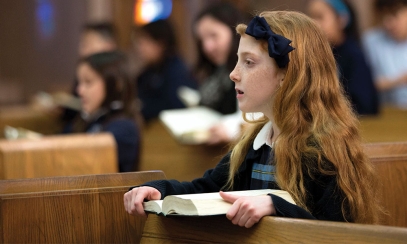
School-aged years
How to raise saints, part 3
How to raise saints, part 3
When the doctor lays your newborn in your arms, the last thing you think about is sending that wee one off to school, but sure enough you blink and it’s time to pull into the school drop-off line or put them on the school bus. Our children spend so many years in school, it’s important to give those years some thought. Here are some ideas about making sure they carry their faith and family values with them as they head off to school.
When the doctor lays your newborn in your arms, the last thing you think about is sending that wee one off to school, but sure enough you blink and it’s time to pull into the school drop-off line or put them on the school bus. Our children spend so many years in school, it’s important to give those years some thought. Here are some ideas about making sure they carry their faith and family values with them as they head off to school.
Know their people
It’s important to know who your children are spending their days with. Ask questions and, better yet, volunteer to help at school or to help coach so you can get to know the kids. Watching kids work, play and interact in their own environment gives parents wisdom and valuable insight.
Clear and open
Expectations need to be clear, consistent and understood. It’s a good idea to establish them when there isn’t a crisis, and refer to them often so when kids have a tough decision to make, they are aware of your expectations and the outcome if they aren’t met. Make comfortable conversation the norm so they won’t be hesitant to chat with you when they have a worry, joy or disappointment to share.
It’s going to happen
It’s inevitable that kids are going to come home with a word, a notion or an attitude that stands in opposition to your family norms, so it’s never too early to help them figure out how to sift and sort. Explain why your family speaks and acts the way they do. Explain that Scripture and our Catholic faith form who we are and what we do … they provide our truth and our foundation. Instead of telling your child Little Johnny is wrong and naughty, you might try, “This is what Jesus taught and it’s what we do/say/believe in our family.” More than once I used the line, “I’m sorry honey but I’m not his/her mom; God picked me to be your mom and this is how I’m helping you get to heaven.”
The gift of time
When our kids have been hurt, disappointed or embarrassed, things can seem so giant. Asking for the help of our patron saint or guardian angel to think things over before we chat about it is always good practice. The truth is, people say and do mean things. As hard as it is to see our kids sad or struggling, walking them through these tough spots while encouraging humility and empathy will help them grow in holiness. Sometimes it takes a little time to sort through the emotions to get to the root of the story. A powerful way to make the best of these experiences is to pray for everyone involved … including the ones who made a mistake or caused the hurt.
Last and first words
In the morning, let the last words your kids hear be: “How can I pray for you today?” They may tell you about the spelling test or soccer tryouts or that boy who won’t let them have the swing. Then let the first thing you say when you see them after school be a question about how the thing they asked you to pray for turned out. These words will provide more insight than “How was your day?” It also reminds us and our children that we are not alone in this day. God is watching over our kids just like he’s protecting us and giving us all the grace to navigate the school-aged years.
Sheri Wohlfert is a Catholic wife, mom, grandma, speaker and writer. Catch her blog at www.joyfulwords.org.



